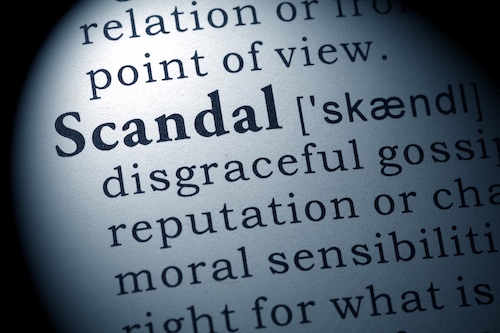Whatever the Court decides, practitioners will welcome further clarity on the issue, since the Tam ruling was a 4 to 4 split decision with no real agreement on the rationale for the holding. “IP lawyers like certainty, and this case has created a lot of uncertainty,” said Monica Riva Talley. “There are a lot of applications on hold at the trademark office right now.”
 In an order that was surprising to some IP practitioners, the United States Supreme Court on Friday agreed to hear Iancu v. Brunetti (Case No. 18-302). The petition for certiorari was filed in November by the United States Patent and Trademark Office (USPTO) on appeal from a U.S. Court of Appeals for the Federal Circuit decision that held the Lanham Act’s prohibition on “immoral” or “scandalous” marks violates the First Amendment’s free speech clause. The case is the second in two years that the Court has taken on the subject.
In an order that was surprising to some IP practitioners, the United States Supreme Court on Friday agreed to hear Iancu v. Brunetti (Case No. 18-302). The petition for certiorari was filed in November by the United States Patent and Trademark Office (USPTO) on appeal from a U.S. Court of Appeals for the Federal Circuit decision that held the Lanham Act’s prohibition on “immoral” or “scandalous” marks violates the First Amendment’s free speech clause. The case is the second in two years that the Court has taken on the subject.
The Scandal
The federal government’s petition specifically asks the Court to consider “whether Section 1052(a) [of the Lanham Act]’s prohibition on the federal registration of ‘immoral’ or ‘scandalous’ marks is facially invalid under the Free Speech Clause of the First Amendment.”
At issue is Erik Brunetti’s FUCT trademark for clothing, which was refused in 2011 because it was considered a scandalous term under Section 1052(a) of the Lanham Act. Section 1052(a) says (in part):
No trademark by which the goods of the applicant may be distinguished from the goods of others shall be refused registration on the principal register on account of its nature unless it—
(a) Consists of or comprises immoral, deceptive, or scandalous matter; or matter which may disparage or falsely suggest a connection with persons, living or dead, institutions, beliefs, or national symbols, or bring them into contempt, or disrepute;…
The Trademark Trial and Appeal Board (TTAB) affirmed the examiner’s decision on the ground that Brunetti used the mark “in connection with apparel and promotional material displaying ‘strong, and often explicit, sexual imagery that objectifies women and offers degrading examples of extreme misogyny,’” according to the USPTO’s petition.
Free to Speak (But Not to Register)
On appeal, the Federal Circuit agreed that the mark was scandalous, but held that the bar on scandalous marks “impermissibly discriminates based on content in violation of the First Amendment.” The government’s petition countered that the “scandalous-marks provision does not prohibit any speech, proscribe any conduct, or restrict the use of any trademark. Nor does it restrict a mark owner’s common-law trademark protections.”
That argument creates something of a conundrum said Brian Iverson of Bass Berry & Sims. “The government’s arguments that lack of registration doesn’t preclude use begs the question, ‘how do you protect these brands if you can use the marks [but registration is not available]?” Iverson said that he wasn’t surprised by the High Court’s decision to grant cert, “in part because, when you read through the petitions, even Brunetti agreed that the Supreme Court should hear the case.”
Brunetti’s reply brief contends that “the Scandalous Clause results in refusal of trademarks based upon viewpoint” and is therefore subject to “strict scrutiny under Reed v. Town of Gilbert, 135 S. Ct. 2218, 2227- 2231 (2015), or heightened scrutiny under Justice Kennedy’s opinion in Tam.” The brief further argues that “[n]o principled reason exists for distinguishing the Disparagement Clause from the Scandalous Clause as to whether the refusal to register is a constitutionally relevant restriction on speech.”
In Matal v. Tam, 137 S. Ct. 1744 (June 19, 2017), the Court affirmed the Federal Circuit’s holding that the disparagement prong of Section 1052(a) was unconstitutional. Monica Riva Talley of Sterne Kessler said that she found the High Court’s decision to hear the case “really interesting” considering the ruling in Matal v. Tam. Many practitioners thought it unlikely that the Court would take a second case so soon after Tam. But the justices could be seeking to distinguish Brunetti from Tam.
“The Supreme Court has consistently ruled that obscenity is not within the rubric of constitutionally protected speech,” said Riva Talley. “Disparagement is more subjective – it depends on who you are. The viewpoint on profanity is more neutral and uniformly applicable.”
On the other hand, the new makeup of the Court might bode well for Brunetti. Justice Gorsuch did not participate in the Tam decision and Justice Kavanaugh was not yet on the Court. “A more conservative court typically is more free speech focused and pro-business,” said Riva Talley. Still, she is leaning toward the Court holding that obscenities are not protected speech and that the bar does not violate the First Amendment.
Sweet Clarity
From a marketing and brand protection perspective, a favorable ruling for Brunetti would probably be helpful, said Iverson. “We’ve seen over the past ten 10 to 20 years the concept of shock value becoming more and more powerful as an advertising tool. The more that continues, the more important those marks will become.”
But whatever the Court decides, practitioners will welcome further clarity on the issue, since the Tam ruling was a 4 to 4 split decision with no real agreement on the rationale for the holding. “IP lawyers like certainty, and this case has created a lot of uncertainty,” said Riva Talley. “There are a lot of applications on hold at the trademark office right now.”
Image Source: Deposit Photos.
Image ID: 106907438
Copyright: Devon

![[IPWatchdog Logo]](https://ipwatchdog.com/wp-content/themes/IPWatchdog%20-%202023/assets/images/temp/logo-small@2x.png)

![[Advertisement]](https://ipwatchdog.com/wp-content/uploads/2024/04/Patent-Litigation-Masters-2024-sidebar-early-bird-ends-Apr-21-last-chance-700x500-1.jpg)

![[Advertisement]](https://ipwatchdog.com/wp-content/uploads/2021/12/WEBINAR-336-x-280-px.png)
![[Advertisement]](https://ipwatchdog.com/wp-content/uploads/2021/12/2021-Patent-Practice-on-Demand-recorded-Feb-2021-336-x-280.jpg)
![[Advertisement]](https://ipwatchdog.com/wp-content/uploads/2021/12/Ad-4-The-Invent-Patent-System™.png)







Join the Discussion
No comments yet.